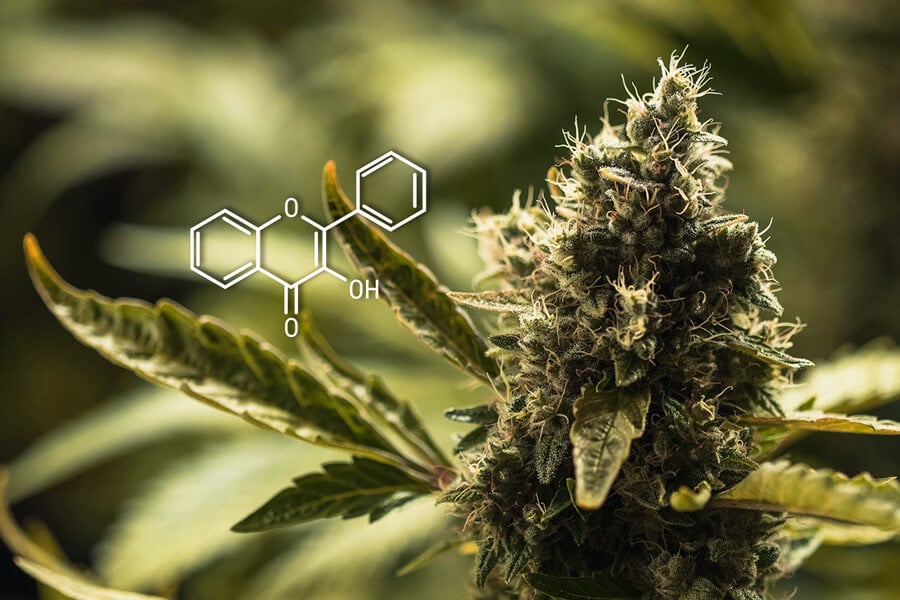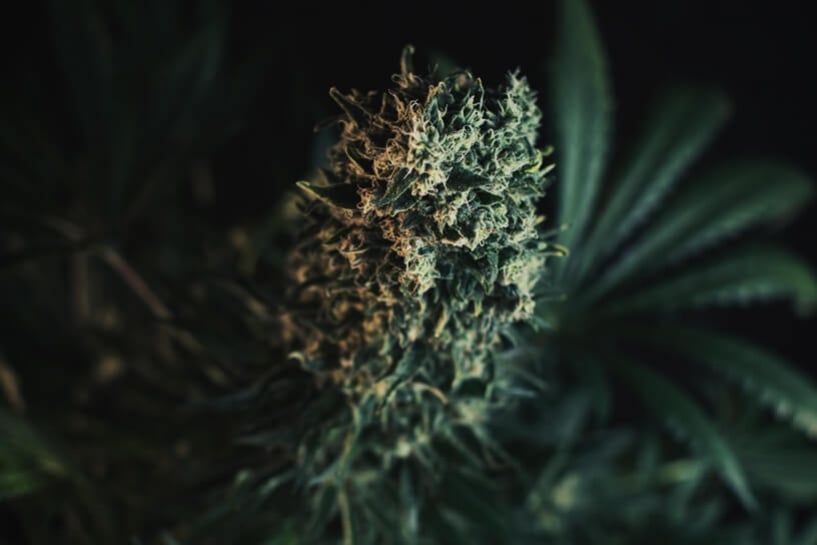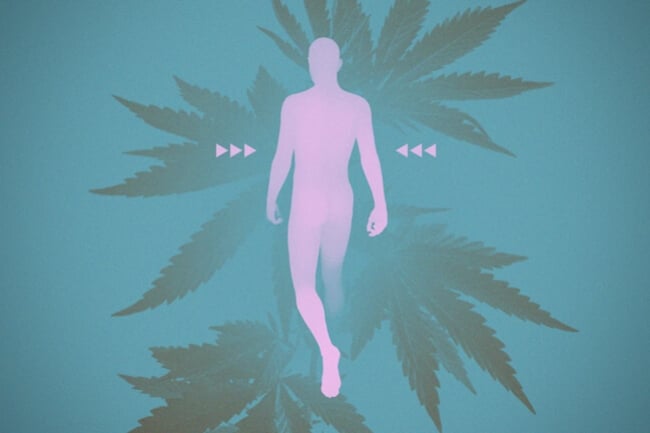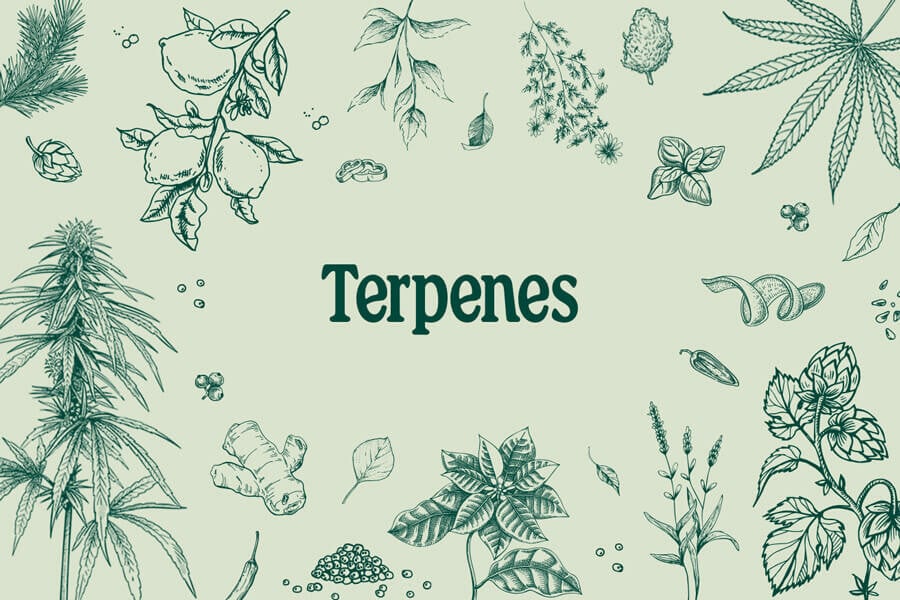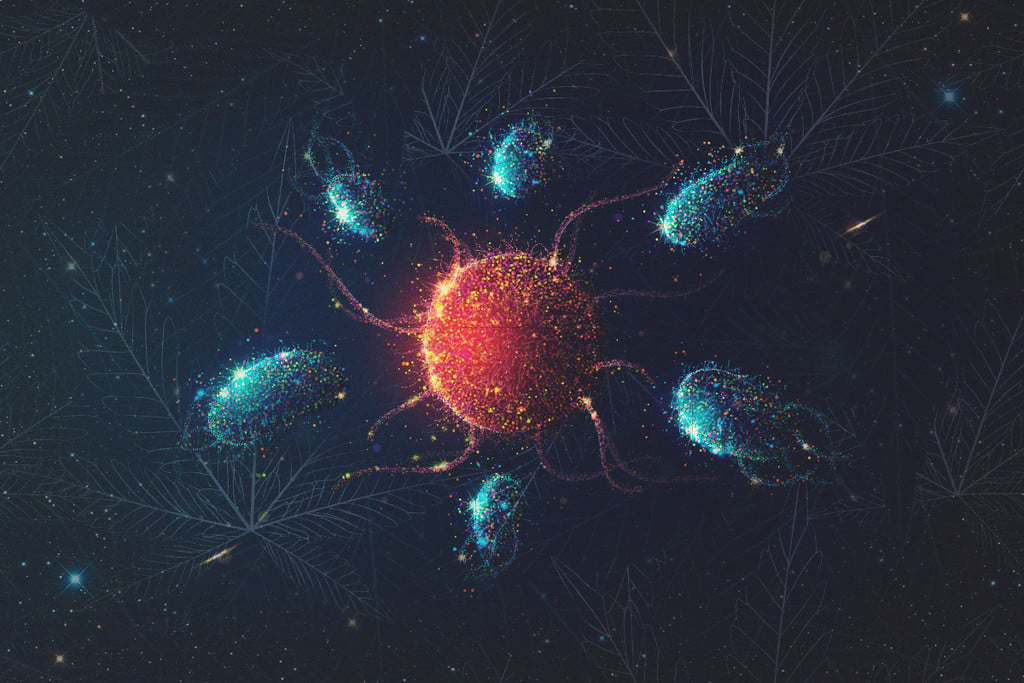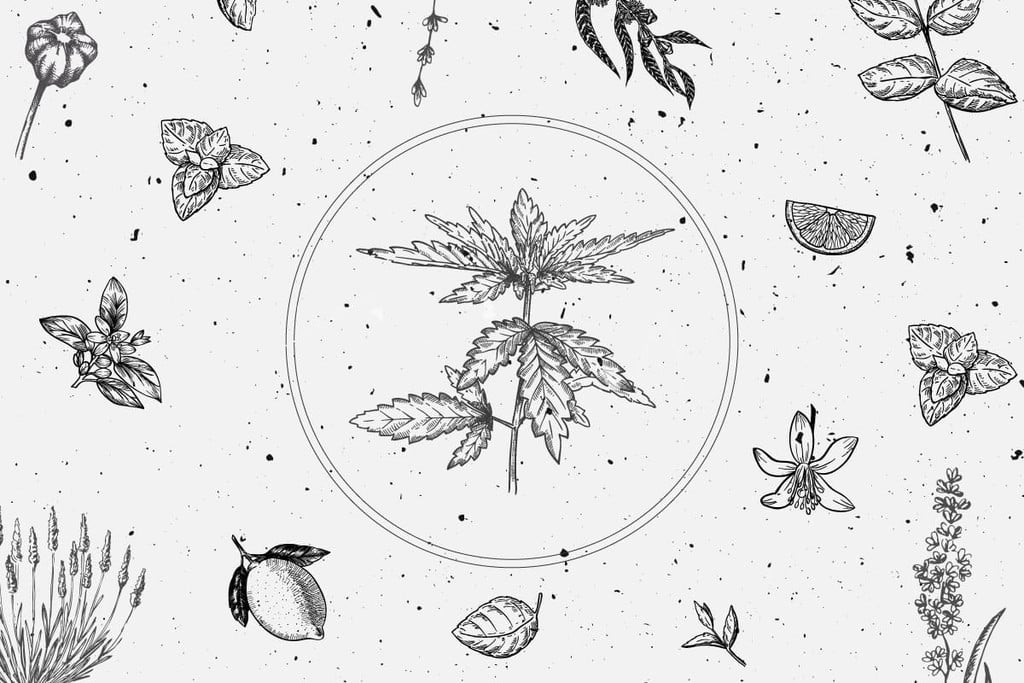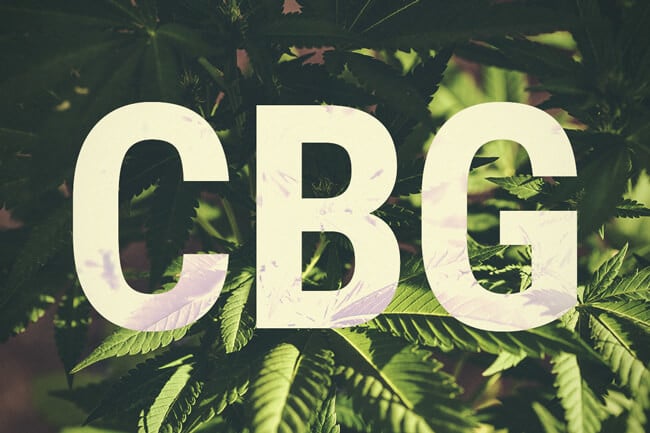.
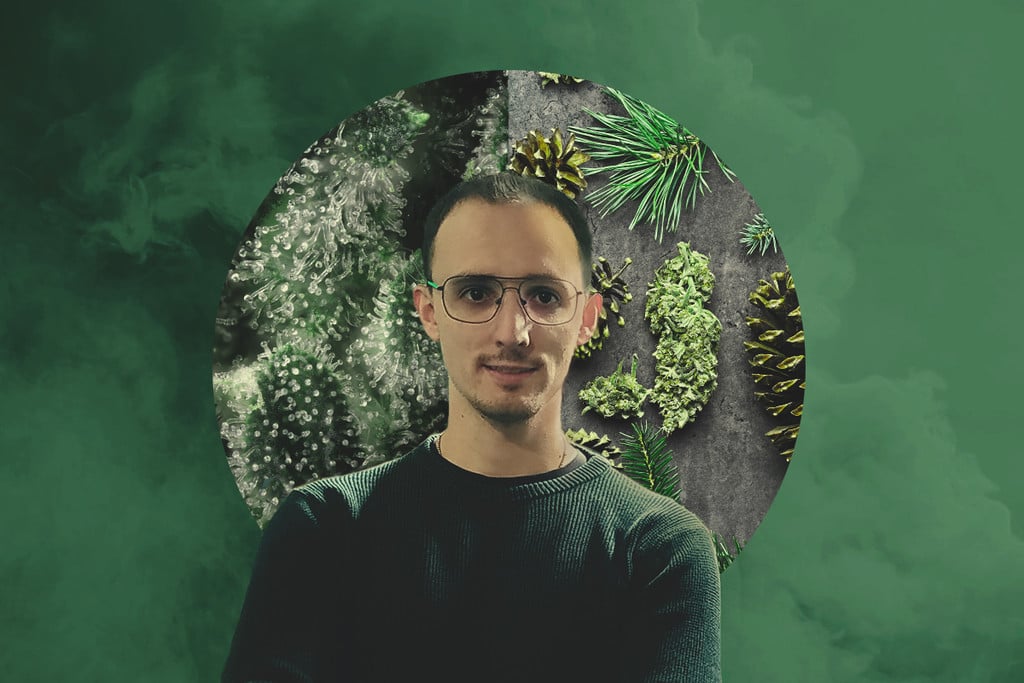
RQS Interviews — Meet Andreu, a Biologist Who Specialises in Cannabis Genetics
Meet Andreu—a biologist with a lot of cannabis knowledge to share. Learn more about the cannabinoids, terpenes, and flavonoids that make cannabis so desirable to growers and smokers.
At Royal Queen Seeds, we are constantly on the lookout for the best information and knowledge about cannabis. In our interviews, we talk to figures from all over the cannabis industry. Today, we have the pleasure of speaking with Andreu.
"Hello, my name is Andreu. I am a 27-year-old biologist specialised in plant breeding. Cannabis is the crop that I have always been passionate about, to the point that I carried out a project on the therapeutic application of cannabinoids during my studies. Currently, I contribute to different R&D projects. Among them is a plant breeding programme focused on creating new cannabis varieties."
|
(Listen to it in Spotify and Apple Podcast) |
|---|
| Listen to it in Spotify and Apple Podcast |
|
In addition to our Podcast Interview with Andreu. ✍️ |
|---|
| In addition to our Podcast Interview with Andreu. ✍️ We’ve done an exclusive Q&A about Cannabinoids, terpenes and flavonoids to get some advice for our readers. You can find Andreu's insights below! |
1. What are cannabinoids, terpenes, and flavonoids in a cannabis plant?
All of these compounds are secondary metabolites of the plant that are not directly involved in its growth, but in the interaction between the plant and its environment. Cannabinoids and terpenes are produced in large quantities in the female flowers, and to a lesser extent in the leaves. However, flavonoids are mainly found in the leaves of the plant.
Cannabinoids are a very broad group of substances that bind to the cannabinoid receptors present in our body. Cannabinoids are not only found in the cannabis plant. There are also endocannabinoids—those produced by our brain—and synthetic cannabinoids, which are synthesised in labs. So far, about 150 cannabinoids have been identified in the cannabis plant, of which very few are psychoactive.
Terpenes are volatile substances that define the organoleptic characteristics (taste and aroma) of the plant. They are responsible for the good or bad taste of a strain when consumed.
Finally, flavonoids are phenolic compounds that have gained importance in recent years due to their antioxidant function. In plants, many flavonoids are expressed in the form of pigments. For example, when we notice that a cannabis plant turns purple, this is because there are compartments inside the cells, called vacuoles, that accumulate a higher content of anthocyanins, and therefore we get this purple pigmentation.
2. Why does cannabis produce these substances naturally?
Plants produce thousands of chemical compounds, and cannabis is no exception. Although cannabinoids and terpenes have a very different effect on people, the plant synthesises them for a common purpose, to defend itself against herbivorous insects. Interestingly enough, insects lack an endocannabinoid system and do not respond in the same way as people. For example, THCA has been shown to induce cell death in insect cells.
Some researchers indicate that cannabinoids also protect the plant against bacteria and fungi, due to their antifungal and antibiotic activity. In addition, terpenes also protect the plant against high temperatures. The plant's strategy is clear; to store these protective substances in the trichomes located on the female flowers—the most important place in the plant, where the seed will be born.
Finally, the plant produces flavonoids to capture certain wavelengths of light different from chlorophylls, which is why certain colours are produced in the leaves and flowers. In addition, it also protects the plant against UV radiation.
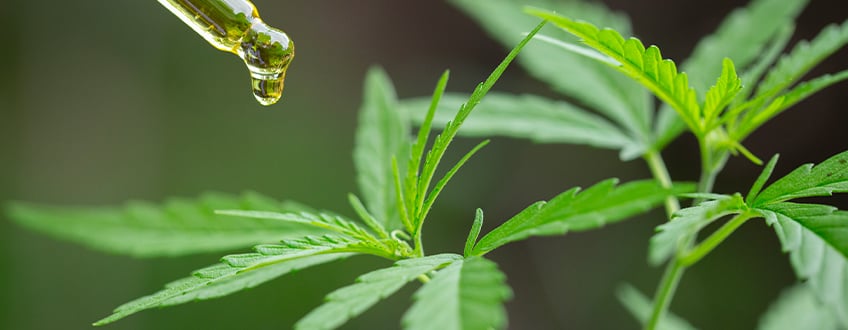
3. In the same cannabis strain, can we always expect the same results in terms of cannabinoids, terpenes, and flavonoids?
No, but this would be ideal. Biology indicates that a phenotype is the expression of a set of genes in a given environment. Based on this simple equation, all plants of the same strain should contain the same genes involved in the production of cannabinoids, terpenes, and flavonoids.
However, as these are complex traits controlled by many genes, there are always small genetic variations. In addition, the growing conditions should be completely consistent for all plants in terms of substrate type, irrigation, fertilisation, temperature, light, ventilation…
"To obtain a good terpene profile, never overdo it with fertilisers during the flowering stage, as they will affect the flavour."
4. Which cannabinoids, terpenes, and flavonoids are most predominantly found in the plant?
Currently, the predominant cannabinoids in the plant are THC and CBD. Although, in recent years we can find strains with minority cannabinoids such as cannabigerol (CBG), cannabichromene (CBC), cannabidivarin (CBDV), and tetrahydrocannabivarin (THCV). The latter has psychoactive properties. Regarding this, I have seen that Royal Queen Seeds has released two varieties with minority cannabinoids, one with CBG and the other with CBDV.
As for terpenes, I would highlight pinene, myrcene, limonene, linalool, and caryophyllene. Each terpene contributes a specific aroma to the strain's organoleptic profile. Finally, although flavonoids are less understood, some are exclusive to the cannabis plant, such as cannflavins A, B, and C, which display an anti-inflammatory function.
5. How do they act in our organism?
Cannabinoids bind to cannabinoid receptors distributed in our body. There are two main cannabinoid receptors: CB1 and CB2. For this reason, a cannabinoid can act on a cannabinoid receptor located in the brain, as well as in the intestine or in a cell of the immune system.
As for terpenes and flavonoids, they participate by modulating the pharmacological action of cannabinoids through the entourage effect. Thus, terpenes and flavonoids modify the action of cannabinoids in our organism. For example, in 2018, a preclinical breast cancer study was published where a higher antitumour efficacy was obtained using a THC preparation with terpenes and flavonoids compared to isolated THC. However, the molecular mechanisms involved between cannabinoids, terpenes, and flavonoids in our body have not yet been described.
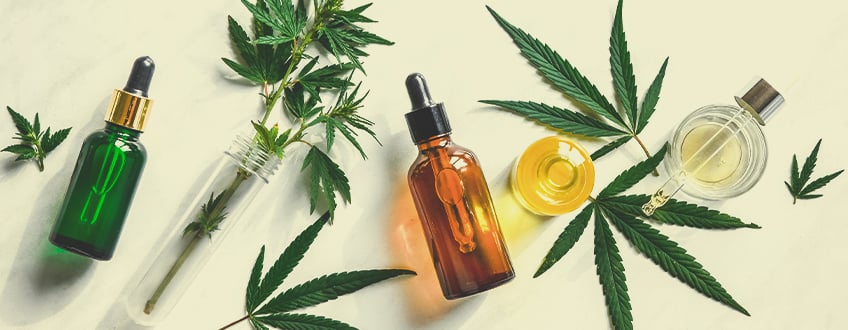
6. Why does THC get us high and CBD does not?
When studying THC and CBD, we can see that their chemical structure is very similar. In fact, their chemical composition is exactly the same: 21 carbon atoms, 30 hydrogen atoms, and 2 oxygen atoms. However, the arrangement of their atoms is different, and thus their chemical and pharmacological properties are distinct.
But, why is THC psychoactive and CBD is not? Very simple; for that we have to look at how they interact with the CB1 cannabinoid receptors, located mainly in the central nervous system. The psychoactive effect of THC is due to its agonist activity with the CB1 cannabinoid receptor. It binds with high affinity and activates it, giving rise to its psychoactive effect.
However, CBD binds with very low affinity to this receptor and also acts as a negative allosteric modulator. This means that its binding does not activate the receptor, but reduces its activity, and thus the stimulation of other cannabinoids such as THC. For this reason, a flower with high THC and low CBD levels will always have a greater psychoactive effect than a flower with high THC and high CBD levels.
7. What is the difference between natural and synthetic cannabinoids?
A synthetic cannabinoid is a synthesised molecule that mimics the chemical structure of THC or CBD to interact with cannabinoid receptors. These compounds were created to investigate possible therapeutic effects and to study the pharmacology of cannabinoid receptors, although in recent years they've also been used as drugs of abuse.
For recreational use, synthetic cannabinoids are mixed or sprayed onto plant material using solvents like acetone or methanol to dissolve the cannabinoids. They are illegally marketed as herbal incenses, flavourings, and fertilisers under brand names such as "Spice", "K2", and "Mojo".
We should clarify that these substances are not natural cannabinoids, nor cannabis, and their consumption is really dangerous. For example, HU-210 has been shown to be 100–800 times more potent than THC. Furthermore, these compounds have not been tested on humans or animals, and it seems that manufacturers tend to create new variations as soon as they are declared illegal. The European Monitoring Centre for Drugs and Drug Addiction (EMCDDA) has detected a total of 169 different synthetic cannabinoids to date.
8. Can we increase the production of cannabinoids, terpenes, or flavonoids in the plant?
Of course we can. From my point of view, it is essential to optimise all growing conditions to obtain the maximum expression of these traits. Personally, I would specifically focus on lighting and fertilisation.
Several studies have shown that LED lighting increases total cannabinoid production compared to high-pressure sodium lamps (HPS). In addition, UV-B light has been shown to increase the concentration of THC and flavonoids. Regarding fertilisation, during the flowering stage it is very important to provide the plant with the necessary macronutrients (especially phosphorus and potassium) and micronutrients, without causing toxicity.
To obtain a good terpene profile, never overdo it with fertilisers during the flowering stage, as they will affect the flavour. Finally, in order to observe some flavonoids, such as anthocyanins, it is not necessary to increase their production directly, but to provide a cooler environment for the plant to degrade the chlorophylls and get that purple colour.
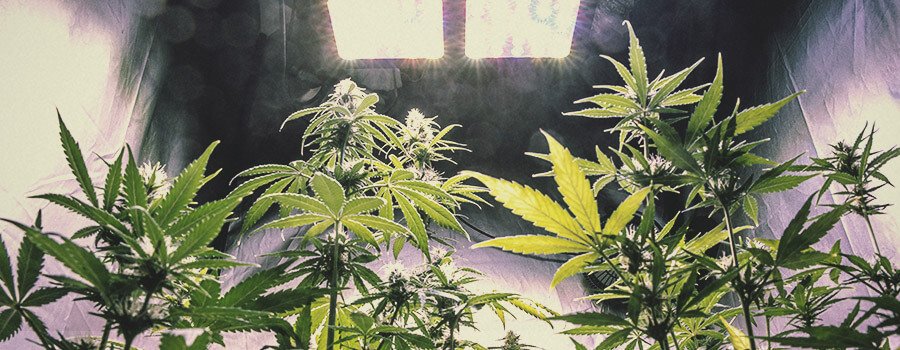
9. Do cannabinoids change according to the way they are consumed?
Yes, they change. Cannabis can be consumed mainly by inhalation or ingestion. In the case of smoking, from the moment it is exposed to the lighter flame, cannabinoids are decarboxylated from their acid form (THCA and CBDA) to their neutral form (THC and CBD). Once the smoke has reached the lungs, those cannabinoids are introduced into the bloodstream at their peak concentration within 2–10 minutes.
However, when we eat raw cannabis, there is no such decarboxylation process, so we consume the cannabinoids in their acidic forms (THCA and CBDA) without the desired effect. For this reason, it is necessary to first decarboxylate cannabinoids by heating them. Once ingested, THC is metabolised in the liver to 11-hydroxy-delta(9)-tetrahydrocannabinol, a psychoactive metabolite similar to THC, and CBD is converted to 7-hydroxy-cannabidiol. The effects of consuming cannabis orally appear between 30 and 90 minutes, reaching their full potential after 2 or 3 hours.
10. What is the optimal decarboxylation process for cannabinoids?
As mentioned above, decarboxylation takes place with the combustion of cannabinoids, converting them from their acid forms (THCA and CBDA) to their neutral forms (THC and CBD). This is a very simple chemical reaction where a carbon dioxide molecule (CO₂) is lost due to high temperatures or UV light. To perform decarboxylation, one should keep in mind that very high temperatures, the presence of oxygen, or light also contribute to cannabinoid degradation. For this reason, cannabis should always be stored in a cool and dark place.
Optimal decarboxylation of THCA is obtained by applying a temperature of 110°C for 30 minutes, 130°C for 9 minutes, or 145°C for 6 minutes. However, with higher temperatures or longer exposure time, THC will degrade to cannabinol (CBN), a less-psychoactive cannabinoid.
In the case of CBDA, the optimal temperature for its decarboxylation varies between 110°C and 130°C for 30 to 45 minutes. In case of degradation, this produces cannabielsoin (CBE), a cannabinoid present in the plant in concentrations below 0.01%.
Finally, it should be noted that each time cannabis is smoked, cannabinoids are completely decarboxylated, but part of them is degraded by combustion. Therefore, to avoid this degradation, it is more advisable to use vaporizers.


























